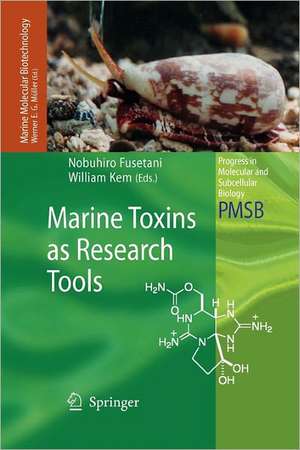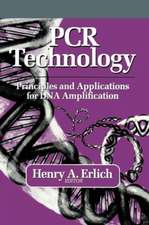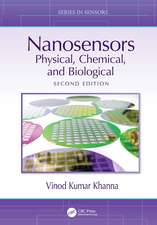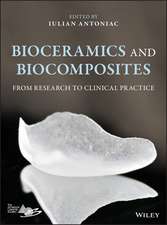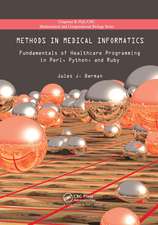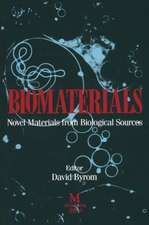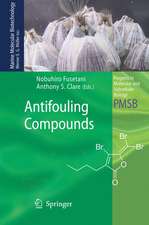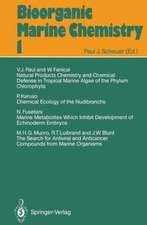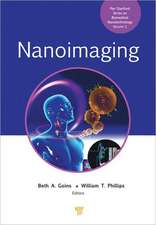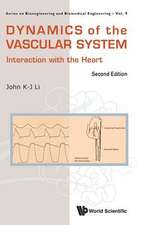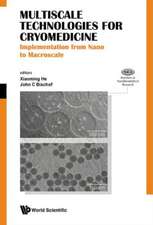Marine Toxins as Research Tools: Progress in Molecular and Subcellular Biology, cartea 46
Editat de Nobuhiro Fusetani, William Kemen Limba Engleză Paperback – 18 noi 2010
| Toate formatele și edițiile | Preț | Express |
|---|---|---|
| Paperback (1) | 1034.94 lei 38-45 zile | |
| Springer Berlin, Heidelberg – 18 noi 2010 | 1034.94 lei 38-45 zile | |
| Hardback (1) | 1222.80 lei 6-8 săpt. | |
| Springer Berlin, Heidelberg – 9 feb 2009 | 1222.80 lei 6-8 săpt. |
Din seria Progress in Molecular and Subcellular Biology
- 18%
 Preț: 1115.46 lei
Preț: 1115.46 lei - 18%
 Preț: 1403.04 lei
Preț: 1403.04 lei - 18%
 Preț: 1112.30 lei
Preț: 1112.30 lei - 18%
 Preț: 1117.03 lei
Preț: 1117.03 lei - 18%
 Preț: 1222.49 lei
Preț: 1222.49 lei - 18%
 Preț: 1382.21 lei
Preț: 1382.21 lei - 18%
 Preț: 1232.26 lei
Preț: 1232.26 lei - 18%
 Preț: 1222.80 lei
Preț: 1222.80 lei - 24%
 Preț: 1045.91 lei
Preț: 1045.91 lei - 18%
 Preț: 956.50 lei
Preț: 956.50 lei -
 Preț: 387.20 lei
Preț: 387.20 lei - 15%
 Preț: 639.73 lei
Preț: 639.73 lei - 15%
 Preț: 633.19 lei
Preț: 633.19 lei - 15%
 Preț: 634.18 lei
Preț: 634.18 lei - 15%
 Preț: 634.00 lei
Preț: 634.00 lei - 15%
 Preț: 640.24 lei
Preț: 640.24 lei - 5%
 Preț: 714.27 lei
Preț: 714.27 lei - 15%
 Preț: 634.32 lei
Preț: 634.32 lei - 15%
 Preț: 637.28 lei
Preț: 637.28 lei - 15%
 Preț: 637.78 lei
Preț: 637.78 lei - 15%
 Preț: 637.28 lei
Preț: 637.28 lei - 15%
 Preț: 649.06 lei
Preț: 649.06 lei -
 Preț: 387.75 lei
Preț: 387.75 lei - 18%
 Preț: 1220.75 lei
Preț: 1220.75 lei - 18%
 Preț: 1224.99 lei
Preț: 1224.99 lei - 18%
 Preț: 946.87 lei
Preț: 946.87 lei - 15%
 Preț: 633.35 lei
Preț: 633.35 lei - 18%
 Preț: 944.36 lei
Preț: 944.36 lei -
 Preț: 387.96 lei
Preț: 387.96 lei - 15%
 Preț: 633.02 lei
Preț: 633.02 lei - 15%
 Preț: 640.88 lei
Preț: 640.88 lei - 5%
 Preț: 720.10 lei
Preț: 720.10 lei
Preț: 1034.94 lei
Preț vechi: 1361.77 lei
-24% Nou
Puncte Express: 1552
Preț estimativ în valută:
198.06€ • 206.52$ • 164.61£
198.06€ • 206.52$ • 164.61£
Carte tipărită la comandă
Livrare economică 17-24 martie
Preluare comenzi: 021 569.72.76
Specificații
ISBN-13: 9783642099687
ISBN-10: 3642099688
Pagini: 276
Ilustrații: XIV, 259 p.
Dimensiuni: 155 x 235 x 14 mm
Greutate: 0.39 kg
Ediția:Softcover reprint of hardcover 1st ed. 2009
Editura: Springer Berlin, Heidelberg
Colecția Springer
Seriile Progress in Molecular and Subcellular Biology, Marine Molecular Biotechnology
Locul publicării:Berlin, Heidelberg, Germany
ISBN-10: 3642099688
Pagini: 276
Ilustrații: XIV, 259 p.
Dimensiuni: 155 x 235 x 14 mm
Greutate: 0.39 kg
Ediția:Softcover reprint of hardcover 1st ed. 2009
Editura: Springer Berlin, Heidelberg
Colecția Springer
Seriile Progress in Molecular and Subcellular Biology, Marine Molecular Biotechnology
Locul publicării:Berlin, Heidelberg, Germany
Public țintă
ResearchCuprins
Marine Toxins: An Overview.- Conotoxins: Molecular and Therapeutic Targets.- Sodium Channel Inhibiting Marine Toxins.- Sea Anemone Toxins Affecting Potassium Channels.- Ligands for Ionotropic Glutamate Receptors.- Marine Toxins Potently Affecting Neurotransmitter Release.- Toxins Affecting Actin Filaments and Microtubules.- Carcinogenic Aspects of Protein Phosphatase 1 and 2A Inhibitors.
Recenzii
From the reviews:
"This book covers the possibilities of marine toxins, potent bioactive compounds, as tools for research based on the large diversity of chemical structures, biochemical targets, and biological effects of this wide group. … The book is a must for any Ph.D. student in biomedical sciences. … Marine toxins as research tools is a unique book that defines the links between marine toxins and their biochemical targets. … the book will help any researcher in biomedicine by showing what to expect from marine toxins." (Luis M. Botana, Analytical and Bioanalytical Chemistry, September, 2009)
"This book covers the possibilities of marine toxins, potent bioactive compounds, as tools for research based on the large diversity of chemical structures, biochemical targets, and biological effects of this wide group. … The book is a must for any Ph.D. student in biomedical sciences. … Marine toxins as research tools is a unique book that defines the links between marine toxins and their biochemical targets. … the book will help any researcher in biomedicine by showing what to expect from marine toxins." (Luis M. Botana, Analytical and Bioanalytical Chemistry, September, 2009)
Textul de pe ultima copertă
Marine organisms produce a wide array of toxins, many of which are not only structurally unusual, but also show potent and interesting modes of action. Since the discovery of tetrodotoxin, a pufferfish toxin, as a potent and selective blocker of Na+ channels in 1964, it has been widely used as a research tool in pharmacological and physiological research. This has led to the identification of a number of important biological functions for Na+ channels. In recent years, much biological research has been carried out at molecular and cellular levels, and therefore selective inhibitors of enzymes and selective antagonist/agonists of receptors and channels have become increasingly important research tools. Accordingly, interest in using such compounds as reagents has increased. Marine toxins are some of the most popular research tools and have already contributed much to our understanding of biological processes and disease mechanisms.
Caracteristici
Highlights the crucial importance of marine toxins as research tools and potential drugs
